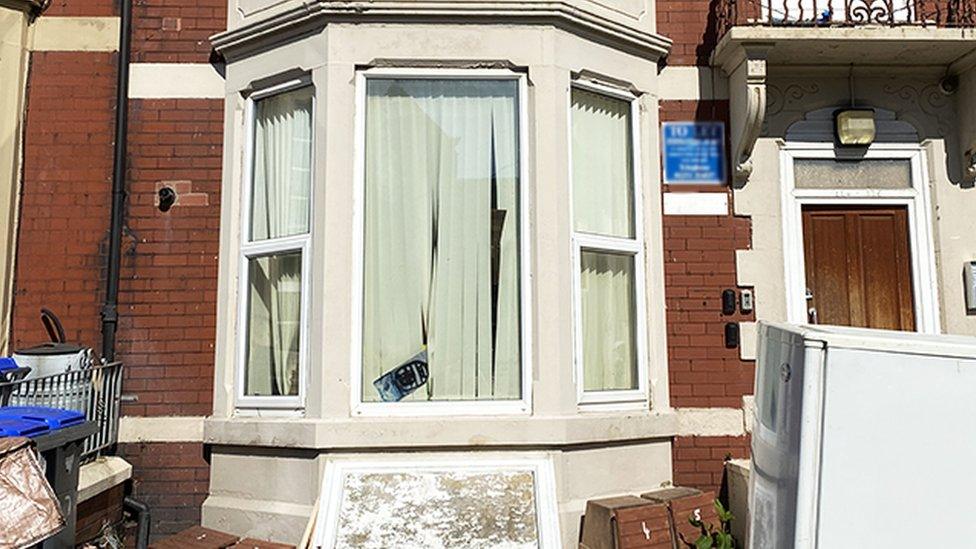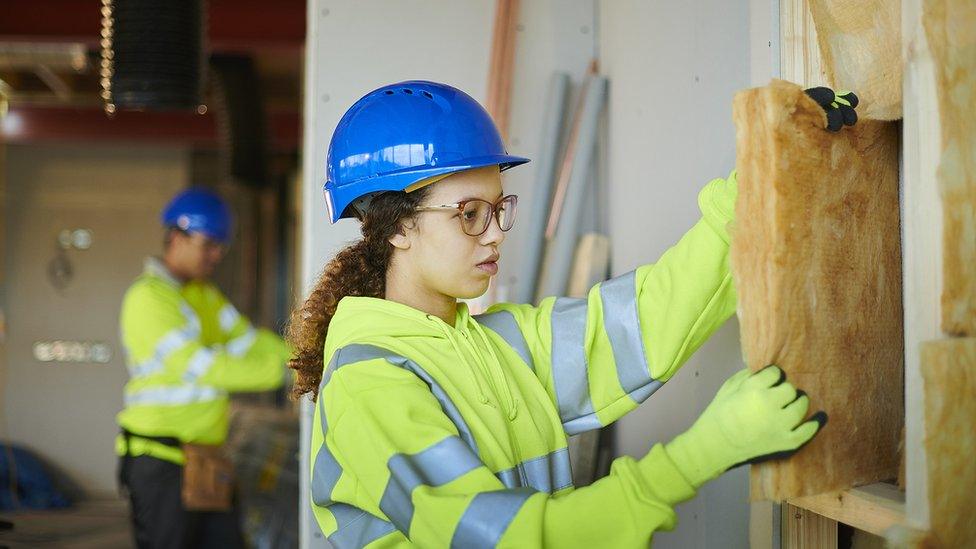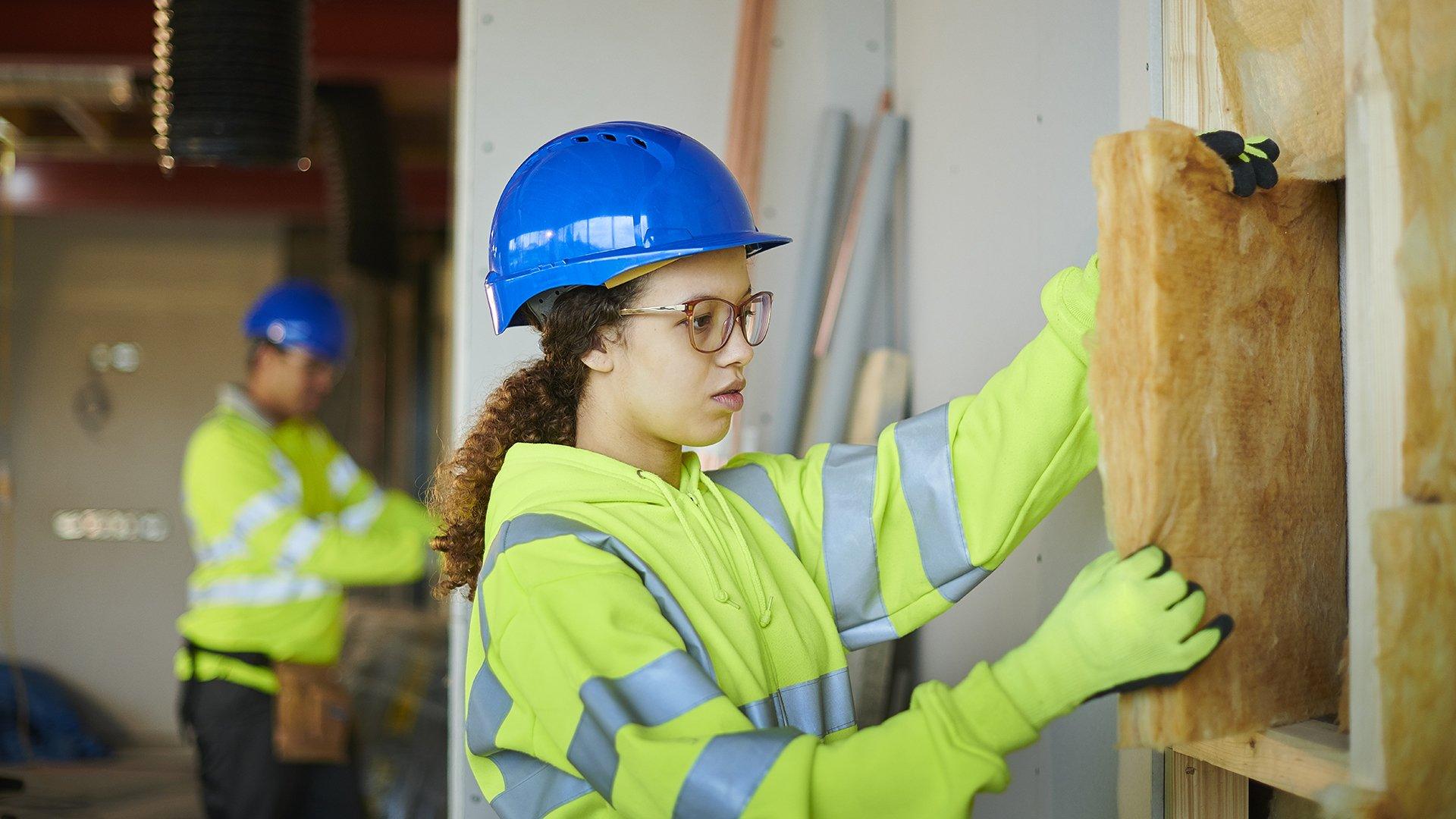Renting: Six out of 10 renters live in energy-inefficient homes
- Published

A rental property in Blackpool - one of the worst areas in the country for low EPC rated rental accommodation
Six out of 10 recently inspected UK rental homes failed to meet a proposed new standard for energy efficiency, a BBC investigation has found.
The government is considering a proposal that would require landlords to make their properties more energy efficient over the next few years.
They say the changes will be "fair and proportionate".
But renters in Blackpool have told Newsbeat they're struggling while living in flats which have poor energy efficiency ratings.
One renter, Louise, says her home has a host of problems - but that she can't afford to move.
"You've got to put down like a month's rent in advance or deposit, and I just haven't got it," she says.
"We're just stuck. But at least I've got a roof, I'm still grateful."
'Constant problems'
By law, all homes that are sold or rented must have an Energy Performance Certificate (EPC), which measures, among other things, how well a property is insulated and heated.
Homes are given a grade between A and G. The closer to A, the more efficient the home, meaning it should have lower energy bills and a smaller carbon footprint.
Blackpool is one of the worst areas in the country for rental homes with low energy EPC ratings.
Louise lives there with her daughter, renting in a flat with an energy efficiency rating of E.
As the price of energy rose over winter she says she did everything she could to keep the house warm, even leaving the oven open after cooking.
"I need new double glazing, got a constant draft in the house, and we have got mould and stuff like that. It's not great," she says.

Adam Royal is hoping to rent a new home with a better energy rating
It's the same situation for Adam Royal, 25, who rents in Blackpool.
"I'm not even joking, it costs probably about £100-plus a month to heat," he says.
"I've got damp and mould in the backroom, in the landing. It's just constant problems and loads of money as well."
The BBC Shared Data Unit found:
Out of 1.9 million inspections of rental homes over the past five years, more than one million fell below grade C
Structural limitations means one in twenty properties will never be able to reach a grade C even if improvements are made
On average, tenants could save a third on their current heating costs if their landlords made all the recommended improvements
Rachelle Earwaker, a senior economist at the Joseph Rowntree Foundation, says tenants in poorly insulated homes are suffering.
"Homes are colder, often damper, and they are much more expensive to heat. In the energy crisis, that has had a massive impact.
"For families with children, or those with disabled family members, or the elderly, there are really big implications of going cold and not being able to heat your home.
"If landlords cannot afford to offer warm and efficient housing, they should not be in the market in the first place."

Conal Land is a case worker at the local Citizens Advice
It's something Conal Land sees almost daily.
"People are going into properties that are mouldy, that are damp, with good health and coming out with poor health," the 24-year-old says.
"They're having to accept they live in these properties that could damage the health, because it's their only option.
"If they complain the property is in disrepair, they run the risk of being given a no-fault eviction and having to find somewhere else to live."
Conal, who is a case worker at the local Citizens Advice, says he's seen the burden on mental health first hand.
"If you're living in a property that's not nice to walk into or that's not enjoyable, it's really hard.
"It's another factor of being in poverty. You're stuck with having to choose these substandard properties, because it's better than being in a hostel or being on the streets."
What's the current law?
In England and Wales, all private rental properties must be rated E or above. Your current rating can be checked on the government's website., external
In 2020, the UK government consulted on plans, external to make the private rented sector more energy efficient.
Under its preferred option, landlords would be required to ensure all new rental properties were at least grade C from 2025.
They would only be required to make improvements up to the cost of £10,000.
Your device may not support this visualisation
What do landlords say?
Chris Norris, the director of policy at the National Residential Landlords Association, says the sector needs up to six years to get the majority of properties to grade C.
"The problem is they've never actually confirmed what the new rules will be.
"You've got lots of landlords who are actually quite open to making changes to their properties but they really don't know what path to take and they can't commit to those spending decisions until we find out exactly what the Government wants to do."
Mr Norris says some landlords will be forced out of the market, or forced to hike up rent.

The UK has some of the least energy-efficient housing in Europe - largely because much of the housing stock is so old.
The government previously set a target to upgrade as many homes to grade C by 2035 "where practical, cost-effective and affordable".
The Department of Business, Energy and Industry strategy says it will respond to its consultation "in due course".
It says the number of homes with a rating of C or above has gone from 16% in 2011 to 47% in 2022.
But Jonathan Winston, a support manager at the Carbon Trust, says change isn't happening fast enough to meet Net Zero targets by 2050.
"It's increasingly the situation that we're running out of time," he says.
In September last year, the government announced plans to help make homes more energy efficient.
The funding is being made available to local authorities and social housing providers with the aim of upgrading 130,000 homes.


Follow Newsbeat on Twitter, external and YouTube, external.
Listen to Newsbeat live at 12:45 and 17:45 weekdays - or listen back here.
- Published29 March 2023

- Published29 March 2023

- Published29 March 2023

- Published28 November 2022

- Published29 September 2022

- Published18 December 2021

